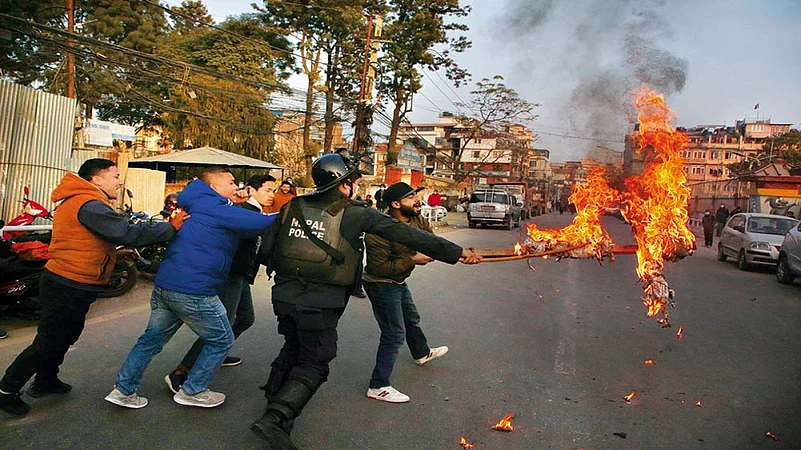With a no-confidence motion hanging like the proverbial sword of Damocles over his head, Nepali Prime Minister K.P. Sharma Oli recommended the dissolution of parliament two years ahead of its scheduled five-year term. On December 20, soon after the PM took the decision, President Bidya Devi Bhandari, a close ally, quickly gave her rubber stamp of approval. Simultaneously, parliamentary elections have been announced for April 30 and May 10 next year.
The move has plunged Nepal into a political crisis. Lawmakers have rushed to the Supreme Court, claiming the move is unconstitutional, considering there was scope for Pushpa Kamal Dahal Prachanda to take over from Oli. Seven ministers close to Prachanda have resigned from the cabinet. So has Madhav Nepal, a former prime minister. The Communist Party of Nepal, which got a two-third majority in the House of Representatives (the lower house) is likely to break up, with Oli and Dahal heading different factions. Considering the squabbling among Communist leaders, it was inevitable that the government would implode. Though Communists do quarrel over ideological differences, it seems that personal ambitions have more to do with the current crisis.
Nepal’s two neighbours, India and China, are closely observing developments. Earlier, China’s dynamic envoy Hou Yanqi had helped defuse a similar crisis and got the two factions to mend fences, thus saving Oli’s government. China has been very active in Nepal since the last few years, as India-Nepal ties plummeted since the 2015 Madhesi agitation against the new republican constitution.

Foreign secretary Harsh Shringla meets the Nepal PM in November.
This summer, India and Nepal had major differences over the Kalapani territory in Uttarakhand, with Kathmandu issuing a new map which showed Kalapani-Lipulekh-Limpiyadhura areas within Nepal. Much of this was Oli’s way of tiding over a political crisis, when asked by Dahal and his supporters to step down.
After managing to cling on to power, Oli decided to bury the hatchet with India. It began with a phone call to PM Modi on India’s Independence Day. Sending out Vijaya Dashami greetings to people in Nepal, Oli reverted to the old map. New Delhi was quick to reciprocate, worried as it was about China’s growing influence in Nepal.
Since then, several high-ranking Indians have visited Nepal. The first was that of RAW chief Samant Kumar Goel in mid-October. He paid Oli a courtesy call. What raised eyebrows in Kathmandu was that the meeting was without the presence of senior ministers. Goel was followed by army chief Gen. M.M. Naravane. Next to visit Kathmandu was foreign secretary Harsh Shringla.
India has not responded to developments in Nepal. Analyst S.D. Muni, who tracks Nepal’s politics, believes India is very much in the loop on the developments. “Prime Minister Oli has been struggling to survive, and this is his response to the latest move to remove him,” Muni says. “Oli will now join hands with the King’s loyalists and fight the elections. The move to restore monarchy and thereby the old Hindu kingdom would be supported and encouraged by the RSS in India,’’ he adds.
Indeed, pro-monarchy and anti-republican rallies have taken place in several places this month. Taking advantage of the infighting within the government, those loyal to the King Gyanendra have called for restoration of the monarchy. Whether the majority of Nepalis would support such a call is not known, but the King will certainly fish in troubled waters.
Most Nepalis also do not accept the argument that India’s instigation is behind the crisis. Analyst Kanak Mani Dixit says: “No one knows what the deep state does, but I do not believe that the current crisis has been instigated and supported by India. It is the result of the ideological and personality clashes within the ruling party, in particular between Pushpa Kamal Dahal and Prime Minister K.P. Oli. Once Nepal’s polity is thus weakened from the inside, it becomes available for another country or forces within it to try to take advantage of the evolving instability.”



























